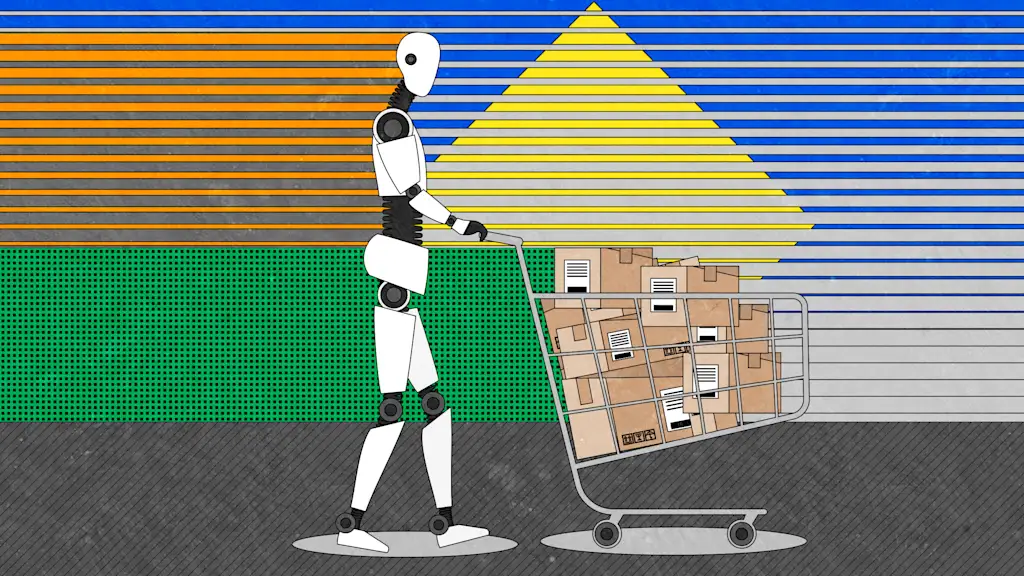#consumer-behavior
#consumer-behavior
[ follow ]
#inflation #tariffs #social-media #holiday-shopping #generative-ai #e-commerce #ai-shopping #holiday-spending
fromFast Company
1 day agoHow discounting hurts long-term loyalty and profits
Discounting has been part of retail's toolkit for decades, and it can be effective, especially during high-stakes shopping seasons. But as promotions become more frequent across the industry, companies are taking a closer look at the downside: Short-term sales gains don't always come with long-term loyalty or durable margins, and customers remember how a brand made them feel far more than what they saved at checkout.
Marketing
fromThe Drum
6 days agoUnderstanding people's 'New World' brand expectations
If you work in marketing, you might want to look away now. The brutal truth is... the vast majority of people don't care about your brand. In fact, 81% of the brands sold across Europe could disappear overnight and consumers wouldn't be concerned... They probably wouldn't even notice. Various dynamics are at play here. Firstly, abundance. With up to 30,000 new products being launched every year, we're all spoilt for choice. With so much variety on offer, very few brands feel truly indispensable.
Marketing
fromTravel + Leisure
1 week agoWe Asked 5 Experts If Basic Economy Is Really Worth It-Here's What They Said
Basic economy fares typically mean no seat selection, last boarding, and limited-or no-checked baggage. The appeal, however, is clear. "Basic economy is a good option for frugal travelers who don't mind forgoing comfort to save on travel costs," Joe Cronin, president of International Citizens Insurance, told Travel + Leisure. He noted that these tickets can cost 20 to 30 percent less than standard economy, making them financially tempting for travelers focused on price above all else.
Business
Marketing
fromBusiness Matters
3 weeks agoHow to Build a Successful Automotive Digital Marketing Strategy
Automotive companies must adopt digital marketing strategies using personalization, automation, and interactive experiences because 95% of buyers start research online and traditional methods fail.
fromBusiness Insider
3 weeks agoA value-conscious shift in customer behavior is rocking the restaurant world. Brands are grappling with these 8 questions.
The restaurant industry is grappling with big questions this year. Diners these days are more value-conscious, more selective, and more willing to stay home; and costs, along with competition, continue to rise for operators. As big chains and local independents try to protect sales or regain their footing, analysts who spoke to Business Insider said the year ahead will come down to whether restaurants can do more with less, without losing what made people want to dine out in the first place.
Food & drink
fromMarTech
3 weeks agoHow inflation reshapes shopping habits and trust in private labels | MarTech
As prices climb, shoppers aren't just spending less-they're spending differently. Nearly half are buying smaller quantities or trading down to lower-cost options, such as canned fruit instead of fresh, according to Capgemini's report, "What matters to today's consumers 2026." It's not about cutting things out entirely-it's about making budgets stretch. Low- and middle-income households are especially deal-focused right now: more coupons, more frequent but smaller trips, and fewer meals out.
Marketing tech
fromPractical Ecommerce
1 month agoThe Psychology of AI SERPs and Shopping
In March 2025, 900 U.S. adults shared their browsing behavior with the Pew Research Center. Roughly 58% of those adults encountered an AI Overview when searching on Google. Only 8% then clicked a traditional listing. Conversely, 42% of Google searchers received no AI Overview; 15% then clicked on a listing. The immediate impact - 8% vs. 15% - is material and measurable. According to eMarketer, zero-click searches have reduced traffic to many websites by 25% or more.
Artificial intelligence
Artificial intelligence
fromForbes
1 month agoIs A People-First Strategy The New Key To 2026 Financial Growth?
People-first brand strategies that prioritize trust, visibility, and emotional connection can counter AI-driven sameness and drive financial growth by restoring authenticity and consumer commitment.
Cars
fromFortune
1 month agoRivian CEO says it's a misconception that EVs are politicized, with R1 buyers split evenly between Republicans and Democrats | Fortune
EV ownership crosses political lines: Rivian buyers are roughly evenly split between Republicans and Democrats, indicating electrification appeals across ideologies.
fromThe Drum
1 month ago3 ways advertisers can support sustainable behavior change with their work
As advertisers do the difficult work to reduce their own emissions, many are turning to another, and possibly even larger, opportunity to have a positive impact on the planet - the messages they choose for their ads. Advertising has the power to positively influence consumer behavior, and every brand can and should consider how their creative work can deliver on that promise.
Marketing
Marketing
fromMarTech
1 month ago4 takeaways for email marketers from Google's 2025 holiday report | MarTech
Holiday 2025 shoppers are increasingly deliberate, research-driven, and influenced by distinct cognitive buyer modalities, requiring modality-aligned, multi-touch marketing and personalized email strategies.
fromFast Company
2 months agoThe insurance coverage squeeze is reshaping healthcare
Every year, open enrollment forces Americans to confront a familiar dilemma: Pay more for coverage that delivers less, or gamble on going without it. This year, that choice has become even starker. Employers are shifting more costs to workers, marketplace premiums are poised to rise, fewer prescription drugs are covered by insurance, and 3.8 million people could lose insurance annually if Affordable Care Act subsidies aren't extended.
Public health
fromFast Company
2 months agoHow the Macy's CEO sees retail in a world of tarriffs and shifting consumer habits (and how he gets ready for the parade)
I think the news certainly makes things more complicated. I think people are confused. We had a terrific second quarter. We talked about the back-to-school business being pretty healthy, and yet we all see potential storm clouds on the horizon. So we're trying to be cautiously optimistic... You could stay up all night worrying... But in reality, our job is to make sure we create a better shopping experience for the customer.
Business
fromZDNET
2 months agoShould you trust AI agents with your holiday shopping? Here's what experts want you to know
In late October, OpenAI launched ChatGPT Atlas, a web browser with ChatGPT at its core. In Agent Mode, it can perform actions on your behalf, such as pulling together an online order. Elyse Betters Picaro, Senior Contributing Editor at ZDNET, tried it that day, successfully using it to place a same-day delivery order from Walmart. The experience was so positive that she then used it to buy Disney on Ice Tickets, which she said saved her some money and hassle.
E-Commerce
fromFast Company
2 months agoGeneric brands are so fancy now that even rich people want to buy them
Grocers have rebranded and grown their portfolio of private label brands over the past several years to cater to consumers pressed by inflation, and it's paid off as the highest-earning shoppers make up an increasingly large share of the economy. Nowhere is this more true than Walmart, the leading grocer since 2019, which launched a new private label called Bettergoods in 2024 that includes products that are plant-based, organic, or gluten-free.
Food & drink
fromRetail Brew
2 months agoMove over Instagram, consumers are turning to each other for shopping advice
Forget influencers and glossy magazines-this holiday season, Americans are turning to each other for shopping advice. New data from Trustpilot's National Write a Review Week campaign shows a 76% YoY spike in consumer reviews. The initiative, which ran October 20-24, attracted ~4 million visitors nationwide-a 63% jump from the same period in 2024-signaling how heavily shoppers are relying on feedback from real buyers. Trustpilot's AI and Black Friday shopping analysis reinforced the trend as 86% of shoppers checked reviews before making a holiday purchase.
E-Commerce
fromObserver
2 months agoHow A.I. Is Changing Black Friday Shopping Forever
A.I. is helping holiday shoppers empty their wallets at an unprecedented pace. U.S. consumers spent a record $11.8 billion online this Black Friday, according to Adobe Analytics, and are expected to shell out another $14.2 billion on Cyber Monday. Driving this shopping frenzy is a growing reliance on A.I. systems to recommend gifts, track prices and place orders. Shoppers are especially turning to chatbots to research products and hunt for deals.
E-Commerce
fromPractical Ecommerce
2 months agoHow U.S. Merchants Fail E.U. Consumers
U.S. merchants eyeing European expansion see 450 million consumers unified under common trade regulations. The reality is different. The European Union harmonizes cross-border commerce rules, but it doesn't harmonize the people doing the buying. This misunderstanding costs conversions in every country. Without payment after delivery, German shoppers bounce. Absent the French language, buyers in France lose trust. Parcel delivery lockers are critical for Polish consumers.
E-Commerce
fromYahoo Life
2 months ago15 Cultural Trends That Lost Popularity Thanks to Millennials
Their unique experiences and values have impacted several aspects of culture, from consumer behavior and communication styles to lifestyle choices and relationship trends. As a result, certain fads and practices that were once popular have fallen out of favor with this influential generation. While some may bash millennials for their perceived aversion to traditional norms, it's important to recognize that their choices often reflect an underlying longing for authenticity, sustainability, and social consciousness.
Marketing
fromFuturism
2 months agoThe Economy Is Sputtering as People Keep Using Their Old Phones That Work Fine
It's easy to understand the reluctance to upgrade. Phones can do loads more than they could a decade ago, and their price tag reflects that. Their cameras are absurdly good, their screens run at buttery smooth framerates, and their hardware is powerful enough to let you play games just as easily as they let you edit video, join conference calls - or, let's be real, doomscroll. How much more juice do they really need with each generation?
Gadgets
Canada news
fromwww.cbc.ca
2 months agoAs Black Friday heralds the holiday shopping rush, are we still dedicated to Buying Canadian? | CBC News
Buy Canadian momentum has cooled; most businesses did not see increased sales, though some hope holiday shopping will revive demand for Canadian-made products.
fromInc
2 months agoHoliday Shopping Trends Brands Must Know This Season
Getting crafty about cutting corners, consumers are changing their approach to holiday shopping. Against a background of intimidating inflation and tariff costs, the traditional peak spending season is moving away from the short, sharp spending spree that it has always been associated with. Instead, shoppers are shunning impulse buys for a more measured, strategic, and information-led approach. Recent holiday shopping reports help identify these trends.
E-Commerce
fromPsychology Today
2 months agoIs Tipping Getting Out of Hand?
As I stood staring at the screen, the tip buttons-20%, 25%, even 50%-blinked back at me like a test I hadn't studied for. Not knowing the answer, I felt a jolt of panic. A line had formed behind me, and I could practically feel the eyes on my back. In my mind, they were all silently judging, waiting to see which button I'd hit. I quickly looked for the button for "no tip," but, under pressure, guilt made the decision for me. I tapped 20%.
Psychology
fromPsychology Today
2 months agoReclaiming Time Through Nostalgia
Two Ways of Living Through Time Clock timers live by external time. They wake up to an alarm, eat breakfast at a designated hour, and arrive at work precisely when the clock dictates. Their day unfolds in neat, measurable units, each activity clearly marked by a start and an end. A clock timer's sense of order comes from synchronizing with the external rhythms of time.
Marketing
fromBenzinga
2 months agoAI Fever Hits High-Income Consumers - But Not The Rest Of America - Zoom Communications (NASDAQ:ZM), DoorDash (NASDAQ:DASH)
Google's Gemini and OpenAI's ChatGPT were the two fastest-growing brands this year among consumers earning more than $100,000 a year, according to Morning Consult. The report measured interest in these tools by purchasing intent, which jumped sharply from the first quarter to the third quarter. Don't Miss: Brand awareness among this income group also skyrocketed. Gemini, for example, rose from 62% awareness early in the year to 78% by the third quarter. ChatGPT remains the most well-known AI tool, with 89% familiarity among high-income consumers.
Artificial intelligence
[ Load more ]













